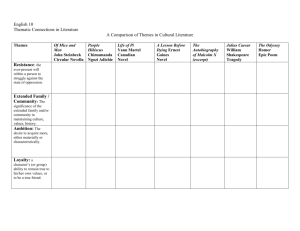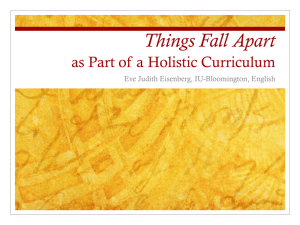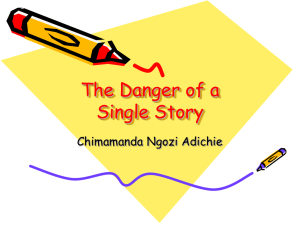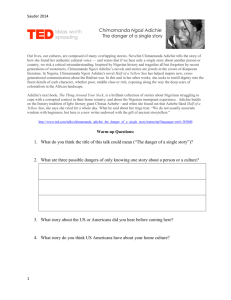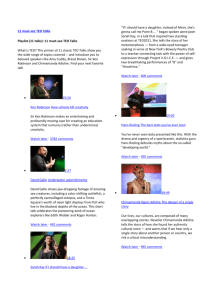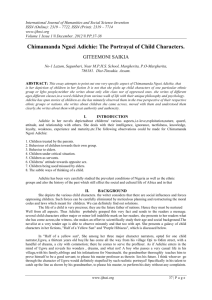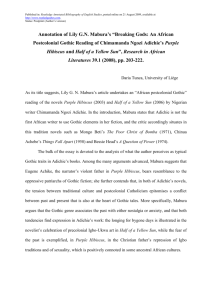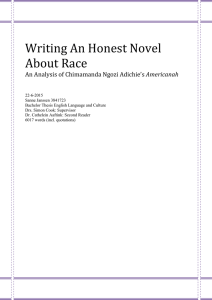Gods and Soldiers: An Anthology of Contemporary African Writing
advertisement
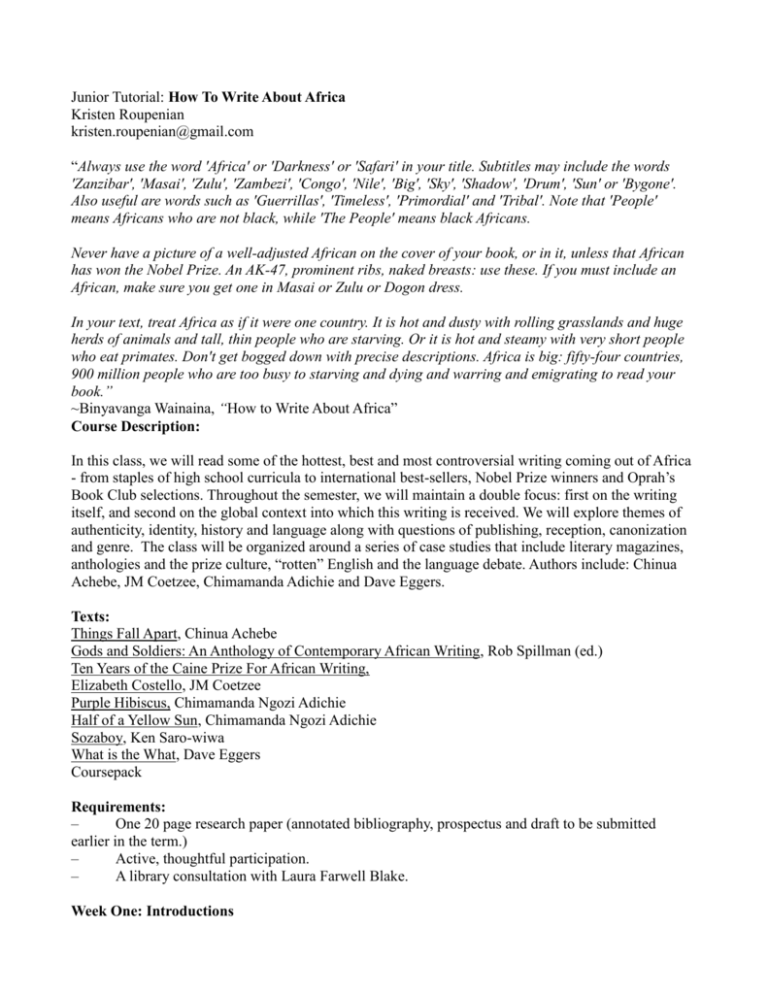
Junior Tutorial: How To Write About Africa Kristen Roupenian kristen.roupenian@gmail.com “Always use the word 'Africa' or 'Darkness' or 'Safari' in your title. Subtitles may include the words 'Zanzibar', 'Masai', 'Zulu', 'Zambezi', 'Congo', 'Nile', 'Big', 'Sky', 'Shadow', 'Drum', 'Sun' or 'Bygone'. Also useful are words such as 'Guerrillas', 'Timeless', 'Primordial' and 'Tribal'. Note that 'People' means Africans who are not black, while 'The People' means black Africans. Never have a picture of a well-adjusted African on the cover of your book, or in it, unless that African has won the Nobel Prize. An AK-47, prominent ribs, naked breasts: use these. If you must include an African, make sure you get one in Masai or Zulu or Dogon dress. In your text, treat Africa as if it were one country. It is hot and dusty with rolling grasslands and huge herds of animals and tall, thin people who are starving. Or it is hot and steamy with very short people who eat primates. Don't get bogged down with precise descriptions. Africa is big: fifty-four countries, 900 million people who are too busy to starving and dying and warring and emigrating to read your book.” ~Binyavanga Wainaina, “How to Write About Africa” Course Description: In this class, we will read some of the hottest, best and most controversial writing coming out of Africa - from staples of high school curricula to international best-sellers, Nobel Prize winners and Oprah’s Book Club selections. Throughout the semester, we will maintain a double focus: first on the writing itself, and second on the global context into which this writing is received. We will explore themes of authenticity, identity, history and language along with questions of publishing, reception, canonization and genre. The class will be organized around a series of case studies that include literary magazines, anthologies and the prize culture, “rotten” English and the language debate. Authors include: Chinua Achebe, JM Coetzee, Chimamanda Adichie and Dave Eggers. Texts: Things Fall Apart, Chinua Achebe Gods and Soldiers: An Anthology of Contemporary African Writing, Rob Spillman (ed.) Ten Years of the Caine Prize For African Writing, Elizabeth Costello, JM Coetzee Purple Hibiscus, Chimamanda Ngozi Adichie Half of a Yellow Sun, Chimamanda Ngozi Adichie Sozaboy, Ken Saro-wiwa What is the What, Dave Eggers Coursepack Requirements: – One 20 page research paper (annotated bibliography, prospectus and draft to be submitted earlier in the term.) – Active, thoughtful participation. – A library consultation with Laura Farwell Blake. Week One: Introductions “How to Write about Africa,” Binyavanga Wainaina Gods and Soldiers: An Anthology of Contemporary African Writing, Rob Spillman (ed). Week Two: Canons Things Fall Apart, Chinua Achebe “An Image of Africa: Racism in Conrad's Heart of Darkness,” Chinua Achebe. “The Nature of Things: Arrested Decolonization and Critical Theory,” Biodun Jeyifo (coursepack). “African Literature and the Anthropological Exotic,” from The Postcolonial Exotic, Graham Huggan Week Three: Language Games Sozaboy, Ken Saro-wiwa “The Language of African Literature: A Writer's Testimony,” Ken Saro-wiwa “The Language of African Literature,” Ngugi wa Thiong'o. “The African Writer and the English Language,” Chinua Achebe. “Ukombozi wa ki Akili Parts 1 and 2,” MC Kah “Prophesies to the Dry Bones,” Kama “Blood and 100% Human Hair,” Martin Mbugua Kimani Week Four: Prizes and Prestige Elizabeth Costello, J.M. Coetzee “Nobel Prize Speech,” J.M. Coetzee “Construction of Apartheid in the International Reception of J.M. Coetzee,” Clive Barnet. Your library consultation with Laura Farwell Blake will also take place this week. Week Five: Prizes and Prestige (Part Two) 10 Years of the Caine Prize for African Writing: Plus Coetzee, Gordimer, Achebe, Okri. “Jumping Monkey Hill,” Chimamanda Adichie. “The New Geography of Prestige,” and “Prizes and the Politics of World Culture,” from The Economy of Prestige, James English. Week Six: Short Story Blitz! “Hunger,” Doreen Baingana. “The End of Skill,” Mamle Kabu “You Wreck Her,” Parselelo Kantai “Icebergs,” Alistair Morgan “Muzungu,” Namwali Serpell Your prospectus is also due today. Be prepared to give a brief (twenty-minute) presentation on your paper topic. Week Seven: From Kwani? To Oprah's Book Club: A Case Study Say You're One of Them, Uwem Akpan “An Ex-Mas Feast,” Uwem Akpan (Kwani? version) “Between Two Continents,” Cressida Leyshon “It Will Change the World if Everyone Reads This Book!,” Trysh Travis Watch online: Oprah's Book Club Say You're One of Them Webcast Video Archive Week Eight: Politics, Place and the New Creative Nonfiction One Day I Will Write About This Place, Binyavanga Wainaina “The True Story of David Munyakei,” Billy Kahora Your annotated bibliography is also due today. Please come to class prepared to speak about one of the secondary sources on your list for about 10-15 minutes. Week Nine: Single Author Case Study – Chimamanda Ngozi Adichie Purple Hibiscus, Chimamanda Ngozi Adichie “The Man Who Rediscovered Africa,” Chimamanda Ngozi Adichie “You in America,” Chimamanda Ngozi Adichie Watch online: “TED Talk: The Danger of a Single Story,” “Coming of Age: Chimamanda Ngozi Adichie and the Voice of A Third Generation,” Heather Hewett. Week Ten: Single Author Case Study – Chimamanda Ngozi Adichie (Part Two) Half of a Yellow Sun, Chimamanda Ngozi Adichie “African 'Authenticity' and the Biafran Experience,” Chimamanda Ngozi Adichie “Breaking Gods: “An African Postcolonial Gothic Reading of Chimamanda Ngozi Adichie's 'Purple Hibiscus' and 'Half of a Yellow Sun,'” Lily G.N. Mabura. A draft of your prospectus is also due this week. Week Eleven: So What is African Literature, Anyway? What is the What, Dave Eggers Secondary Material TBD. Week Twelve: Party and Paper Presentations You should come to class prepared to give a 30 minute presentation about your final essay. Then we will have a party.
